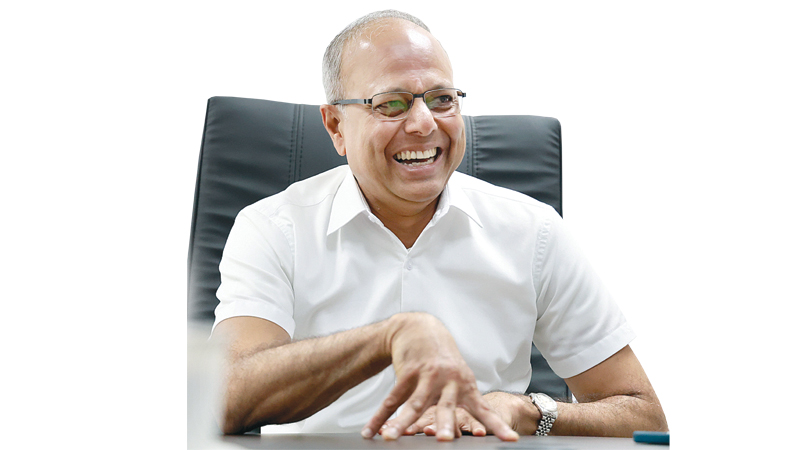 As the election countdown intensifies, the Sunday Observer spoke to Sagala Ratnayake, former Chief of Staff and National Security Advisor to former President Wickremesinghe to discuss the recent electoral loss and the future trajectory of the UNP. Ratnayake said that the coalition under the gas cylinder failed due to communication missteps, although the ‘change’ a called for by the youth was undertaken during their tenure. He is worried that the NPP lacks a coherent economic policy and still acts like they are in the Opposition without clear goals for the country.
As the election countdown intensifies, the Sunday Observer spoke to Sagala Ratnayake, former Chief of Staff and National Security Advisor to former President Wickremesinghe to discuss the recent electoral loss and the future trajectory of the UNP. Ratnayake said that the coalition under the gas cylinder failed due to communication missteps, although the ‘change’ a called for by the youth was undertaken during their tenure. He is worried that the NPP lacks a coherent economic policy and still acts like they are in the Opposition without clear goals for the country.
Q: What factors contributed to the recent electoral loss and what lessons have you taken from this experience?
A: Our sole focus was on developing the economy. It had completely collapsed when we took over and we worked on building the economy while also bringing in the structural reforms —fiscal, monetary as well as governance reforms. We wanted the SJB and the NPP to join us and help us. Two members from the SJB joined and later a third also came but the party itself didn’t join. We didn’t want them to handle Ministries. They could have helped because the country was in dire need of assistance. Everyone was needed to come together but they didn’t join. Instead, they worked hard to destabilise the situation, especially the NPP.
They organised protests, got the entire teaching sector on the road, mobilised the non-academic university staff and disrupted education from the primary all the way to university level. At every turn they obstructed us, whereas we were focused on making sure the people of Sri Lanka could have their lives rebuilt and have a solid country to live in, with a good economy. We should have done a little bit more in the political firmament but there simply was no time.
Another factor was a lack of communication. We did do a lot of good things. Everything we did was helpful for the country but we didn’t communicate in simple, understandable language what those achievements would mean for the people. This, I believe was a major impact which led to the recent electoral loss.
Q: How does the UNP plan to reposition itself in response to this defeat?
A: This election came up suddenly and that was a challenge. We are moving ahead as an alliance again, mainly with the same members who supported former President Wickremesinghe. This team is experienced and they worked together to rebuild the country during the crisis, so they have that shared experience, which is one of the reasons we’ve stayed together. Both left-of-centre and right-of-centre we will stabilise and reorganise our parties. We aim to regroup the Right while they regroup the Left, allowing us to be politically strong again. The UNP’s reorganisation plan will focus on a strong ground presence alongside a digital organisation moving forward.
Q: Ranil Wickremesinghe has said he will not contest further elections, yet he seems actively involved in election work. What is the leadership succession plan in the UNP? Why does a major party such as the UNP not have a clear succession plan?
A: He has said he won’t contest a Parliamentary election, which is not unusual even former President Chandrika Bandaranaike Kumarathunga, following her tenure did not return to contest the Parliamentary elections. Wickremesinghe will provide leadership for the elections to the National Democratic Front (NDF) and will remain as the UNP leader until we regroup and reorganise, allowing a succession plan to succeed. If we try to appoint a new leader now, it would lead to a lot of infighting. The re-organisation will reveal who emerges as a leader and this could be someone within the party or even a new figure. We definitely need new faces in the party, especially at the grassroots level. Through this process, we hope for a clearer sense of who will take over the party.
Q: Many young people have been vocal about social issues, corruption and economic mismanagement. Do you feel that the administration was unable to effectively connect with the younger generation and address their concerns?
A: The younger generation wanted a Wenasa or change. We provided that change by addressing both economic mismanagement and corruption. However, our weakness in communication, coupled with their lack of clarity about the change they wanted caused a disconnect. We are to blame — we should have worked harder to communicate with them. On the economic front, we enacted a comprehensive set of reforms passing 42 new Acts in Parliament covering fiscal and monetary reforms.
In terms of governance reforms, we implemented a comprehensive anti-corruption program, including establishing a new Anti-Corruption Commission. Beyond that, we prepared an action plan, not just to pass laws but to fully implement them. For example, when it came to the Anti-Corruption Commission, we made sure that it was equipped with the technology, human resources and training to function properly, even going as far as providing international training when required.
To root out corruption, we realised that relying solely on traditional personnel from CIABOC or the police and the Attorney General’s Departments were insufficient. We need technical experts and for that different salary scales are necessary. We set these provisions so that they can recruit the right talent and train them accordingly.
We did everything the youth wanted and they expected but I believe that we did not use the right language to communicate it.
Q: Do you believe that the coalition with the SLPP, SLFP and other parties contributed to Ranil Wickremesinghe’s defeat?
A: I wouldn’t say the coalition caused his defeat. We worked closely with these parties to support the President in rebuilding the country. The SJB and the NPP didn’t step up to support this effort. The President needed strong support in Parliament and a capable Cabinet, and these parties provided that. Ministers in energy, technology and finance, for instance, worked extremely hard and stayed focused on the program. There’s a tremendous amount of experience among these ministers and they drove reforms in areas such as the energy sector that wouldn’t have been possible without their backing. Of course, there is individual criticism but it’s up to the voters in this election to recognise and protect those ministers who made a positive impact and let go who they think is unsuitable.
Q: As a candidate from Colombo, what specific issues are you aiming to address in this District?
A: My focus on Colombo grew during the crisis when I couldn’t travel frequently to Matara. I was working continuously, seven days a week for two years, with only two days off. We handled multiple programs during the crisis, addressing the food shortage, launching Aswasuma, organising scholarships, agri-tech projects, and fertiliser distribution. I saw the reality in Colombo up close with families of three or more squeezed into a 100-square-foot home, living in harsh conditions with water leaks and children dealing with constant health issues. I realised that working from the centre of Colombo could allow me to be more effective, not just for this city but for the country.
We developed a master plan for Colombo’s growth, encompassing economic development and more than just infrastructure. This plan, created by Surbana Jurong — the same consultants who designed Singapore’s growth decades ago — identifies priority projects such as tourism development around the Colombo Port precincts and low-income housing. As for houses, the Government can’t fund everything, so we aim to partner with the private sector for mixed development projects that include low-income housing. We were waiting for the final stage of the loan restructuring, which will improve our credit rating and allow us to attract international investment for these projects.
Q: How would you support an NPP-led Government if elected, in that the people have given them a mandate?
A: If we’re in Government, we will work alongside the President, as laid out in the Constitution. We have experience working across party lines as with former President Chandrika Bandaranaike Kumaratunga and former Prime Minister Ranil Wickremesinghe in 2001. Together, they reversed the economic downturn from a negative three percent to positive growth over a few years. It wasn’t easy, but checks and balances are in place to facilitate cooperation. I don’t see why we can’t make it work again if necessary.
Q: What economic mistakes do you think the NPP has made recently?
A: Even to make mistakes, I do not see them having a clear plan. They continue to act as though they’re in Opposition, focusing on minor issues such as MPs’ privileges, former Presidents’ privileges and even a vegetable patch at the President’s house. But what we need is a solid plan to grow the economy by over three percent achieve a 2.3 percent primary surplus, and create high-paying jobs to keep young people from leaving the country. Our economy has been stagnant due to Covid-19 pandemic and the financial crisis, and any new Government must have a clear policy direction to address these issues.
The present administration has shown no clear strategy. They haven’t presented a policy in Parliament or publicly. And their list of parliamentary candidates lack governance experience. Running a country requires more than just enthusiasm — you need seasoned leaders. Even new Governments in the past have maintained a mix of experienced and new people. If they’re going to rely solely on officials to run things, then what’s the role of the Government?
Picture by Dushmantha Mayadunne









